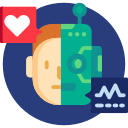This website uses cookies so that we can provide you with the best user experience possible. Cookie information is stored in your browser and performs functions such as recognising you when you return to our website and helping our team to understand which sections of the website you find most interesting and useful.

The Role of AI in Modernizing Healthcare Infrastructure
Artificial Intelligence (AI) is rapidly redefining the landscape of healthcare, driving significant transformation across infrastructure, operations, and patient care. The integration of AI technologies not only streamlines processes and enhances decision-making but also fundamentally reshapes how health organizations function, handle data, and deliver services. Through intelligent automation, predictive analytics, and machine learning algorithms, AI is enabling a smarter, more responsive, and efficient healthcare ecosystem. This page explores the multifaceted role of AI in advancing modern healthcare infrastructure, providing a comprehensive look into its profound impact on everything from data management and diagnostics to patient engagement and beyond.
Improving Clinical Decision Support

Enhancing Operational Efficiency
Automated Scheduling and Resource Allocation

Advancing Data Management and Security


